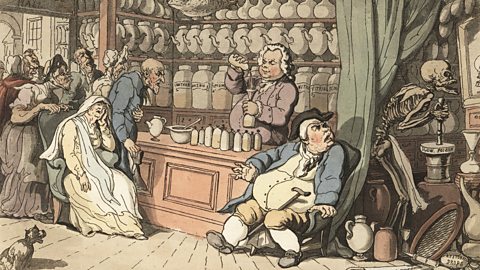Treating the sick
Despite many discoveries and advances in medicine, there was still very little progress in knowledge of the causes of disease or effective treatments during the RenaissanceThe revival or rebirth of European art and literature under the influence of classical Roman and Greek culture during the 14th to 16th centuries. There were several types of care available.
Hospitals
There was an increasing number of hospitals in the 17th and 18th centuries. The monasteryThe building where monks live. had been closed down by Henry VIII in the 1530s, so towns needed to open hospitals to take their place. St Bartholomewโs Hospital in London had been a monastery. However, Henry VIII allowed the hospital part of the building to be taken on by the London authorities.
Treatment in hospitals was usually based on the four humoursFour bodily fluids โ yellow bile, black bile, blood and phlegm โ used in ancient times to analyse and describe people's state of health. so bloodlettingThe process of bleeding a patient, either by using leeches or by cutting into a vein. and purgingIn historical medicine, the act of getting rid of fluid from the body for the purpose of balancing the four humours. Patients might take substances to make them vomit or empty their bowels. were common. Hospitals received money from wealthy donors or royal endowments, so they could provide care for people who could not afford a physician A person who practises medicine.
Physicians
Physicians were doctors who had trained at university. They were considered to offer the best medical care. Most of the diagnoses and treatments they suggested were based on the works of HippocratesA Greek doctor 400 BC approx. He is called the 'father of modern medicine' as he developed the theory of the four humours, and the idea of observing and recording illnesses and diseases. and GalenA Roman doctor who lived from AD129 to approximately AD203. He revived Hippocrates' ideas and encouraged bloodletting as a treatment, after learning about anatomy from treating injured gladiators. and the theory of the four humours.
Physicians were expensive and therefore tended to treat richer people or royalty. Monarchs would have their own private physicians to treat them when they were ill.
Apothecaries
An apothecarySomeone like a modern-day chemist, apothecaries understood both the healing and poisonous properties of plants and herbs. was similar to a modern chemist. They would sell remedies and medicines to surgeons and members of the public. The medicines they sold were often based on herbal remedies, passed down through the generations. An apothecary usually trained as an apprenticesYoung people in training for a trade, who work for a lower wage to learn their masterโs skills. working with an experienced apothecary to learn the various treatments and mixtures that could be used.
Quack doctors
As most people could not afford a physician, they had to look elsewhere for medical advice and treatments. Quack doctors were unqualified and often claimed to be selling miracle cures. They sold potions that supposedly contained all kinds of mysterious ingredients, such as crushed unicorn horn. These remedies did nothing to help people recover, and in some cases could make symptoms worse. However, until Pasteurโs germ theory, there was a lack of scientific knowledge to challenge these ideas.
